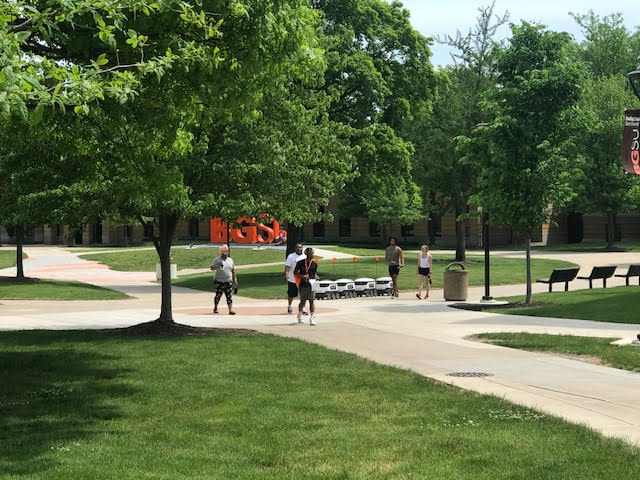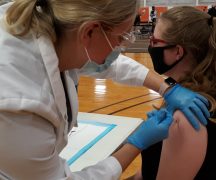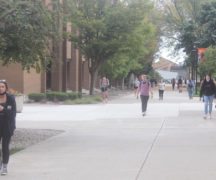By DAVID DUPONT
BG Independent News
The university’s chief health officer is confident that campus will be operating in an open and “normal” way when classes resume in a few weeks even as the Delta variant of the novel coronavirus that causes COVID-19 continues to spread.
“We’re hoping for as close to normal as we can get,” Ben Batey said in a recent telephone interview. The Bowling Green State University will continue to work with the Wood County Health Department and the Wood County Hospital.
The university leveraged partnerships with these agencies as well as the city since March 2020. “Just working in such a cohesive function helped us navigate the pandemic well,” he said.
Now students will be back to taking classes in person, though online and some hybrid options will remain available. Students say they want in person classes, he said. (A study conducted by faculty with a National Endowment for the Humanities confirmed this as well.)
Athletic events and arts performances will be offered.
Activities, especially those outside, will go as usual. People are ready for these to resume, he said.
The rise of the Delta variation “does create a bit of a concern,” Batey, who formerly served as Wood County health commissioner, said. “Yes it is more transmissible, and it is causing our numbers go back up.”
Still BGSU, he said, is in a good position.
While younger populations are the less likely to be vaccinated, he’s confident the student population bucks that trend. He expects the university will see a higher percentage of students vaccinated. They lived through a year of public health messaging, and they don’t want to end up in isolation or quarantined. Many were “on the frontlines” Batey said.
The Wood County is in a good position in terms of vaccination, especially among its most vulnerable population, older people. Its vaccination rate among that demographic is second best in the state.
“We are in a much better position than we were last year,” he said. “We didn’t have vaccines. We didn’t have adequate testing available. And we didn’t have individuals with immunity. We have a much higher percentage of individuals with immunity, either through vaccination or contracting the virus. So I think locally we’re still in an extremely better position than we were last year.”
And should there be a resurgence, Batey added, BGSU is better prepared. “Everything we learned last year, we have readily available to scale up to the demand we have.”
The rapid testing at the hospital is still available. And testing can still be done on campus.
That was available into the summer, he said, but they put the testing on hiatus because of lack of demand.
The university is working now to try to determine how many students are vaccinated.
At the end of the spring semester the university offered massive vaccination clinics in the field house that administered about 13,000 shots. Batey does not see a need for such a large clinic now.
Instead, he said, the university working with the Falcon Health Center to offer shots in the student union. That’s a central location for students, staff, and faculty.
“We’ll have vaccines available for anyone who wants to get vaccinated.”
Batey stands behind the vaccinations. “Everyone should get vaccinated because it’s very apparent that the risks of COVID far, far outweigh any minimal risks of the vaccine,” he said.
However, he does not support mandating the vaccine for students or university employees.
“It’s an important topic, one that every individual has to navigate for themselves.”
The vaccines are still approved for emergency use. “I understand people who want to wait until the full approval comes forward.”
The university has also launched #VaxBGSU, a COVID-19 vaccination incentive program for students, faculty and staff. The program allows students to voluntarily submit their vaccination status to be entered in drawings for a variety of prizes, including one full-tuition scholarship. Faculty and staff are eligible for a separate drawing.
In the press release announcing the incentive, Batey states: “This incentive program gives us a better understanding of vaccination rates in our community and will help us navigate COVID-19 throughout the fall.”
Batey said it is possible face covering mandates may return based on CDC guidance and how the resurgence of the pandemic evolves.
He noted that with winter its seasonal increase in flu and colds approaching, a hike in COVID-19 cases can also be expected. At that point masks may be needed.
He noted that last winter, “we didn’t have flu season because of the protocol of mask wearing.”
This may be “the new path forward. … the new normal” during flu season.
Batey is also said that the attitude toward public health may change because of the pandemic. “Hopefully this ends up being a huge positive for public health, not only for my work at BGSU but for public health around the country. I think for a long time public health operated in background and went unrecognized. Nobody noticed because nothing was going wrong health-wise. We were doing a good job,” he said.
“I think hopefully attention about how public health is integrated into all aspects of a person’s life and the prevention aspects should get more attention.”
If more attention had been paid to the guidance of public health authorities early in the pandemic, Batey said, “we could prevented the whole thing.”





